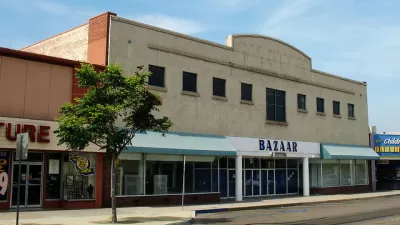A number of cities are considering hiking up taxes on vacant properties. But does that actually lead to a reduction in blight?

Cities like San Francisco, Oakland, and New York City are considering following Washington, D.C. to implement vacancy taxes. J. Brian Charles writes, "cities are turning to vacant property taxes to nudge property owners of both retail and residential spaces to lease, develop or sell their properties before a short-term vacancy turns into what some cities see as blight."
"In 2016, Washington, D.C., collected $9.4 million in vacancy taxes. Still the effectiveness of the tax remains unclear, according to a 2017 report from Pew Charitable Trusts. When asked, the city could not say how many properties were leased, improved or sold as a result of the tax, according to the Pew report.
A concern is that in hot markets, landlords who may be holding out for high-end renters will end up settling for a national chain. "Levying a tax might drive a landlord to fill a vacancy, but the new tenant may not be the type that made neighborhoods like Greenwich Village, the Mission District in San Francisco or Columbia Heights in Washington, D.C., attractive in the first place." And there's also the worry that physical retail may inevitably decline, replaced by online vendors.
FULL STORY: Cities Now Use Taxes to Fight Blight. Is It Working?

Planetizen Federal Action Tracker
A weekly monitor of how Trump’s orders and actions are impacting planners and planning in America.

Maui's Vacation Rental Debate Turns Ugly
Verbal attacks, misinformation campaigns and fistfights plague a high-stakes debate to convert thousands of vacation rentals into long-term housing.

Restaurant Patios Were a Pandemic Win — Why Were They so Hard to Keep?
Social distancing requirements and changes in travel patterns prompted cities to pilot new uses for street and sidewalk space. Then it got complicated.

In California Battle of Housing vs. Environment, Housing Just Won
A new state law significantly limits the power of CEQA, an environmental review law that served as a powerful tool for blocking new development.

Boulder Eliminates Parking Minimums Citywide
Officials estimate the cost of building a single underground parking space at up to $100,000.

Orange County, Florida Adopts Largest US “Sprawl Repair” Code
The ‘Orange Code’ seeks to rectify decades of sprawl-inducing, car-oriented development.
Urban Design for Planners 1: Software Tools
This six-course series explores essential urban design concepts using open source software and equips planners with the tools they need to participate fully in the urban design process.
Planning for Universal Design
Learn the tools for implementing Universal Design in planning regulations.
Heyer Gruel & Associates PA
JM Goldson LLC
Custer County Colorado
City of Camden Redevelopment Agency
City of Astoria
Transportation Research & Education Center (TREC) at Portland State University
Jefferson Parish Government
Camden Redevelopment Agency
City of Claremont




























